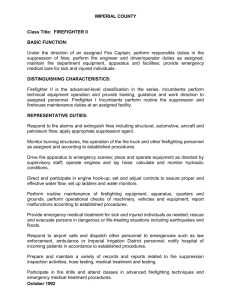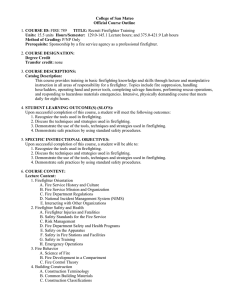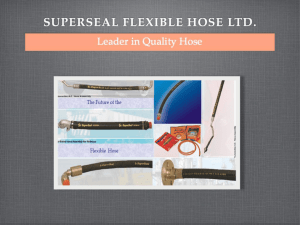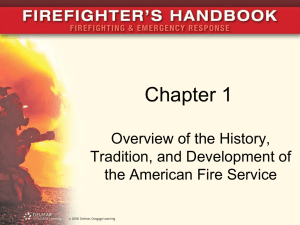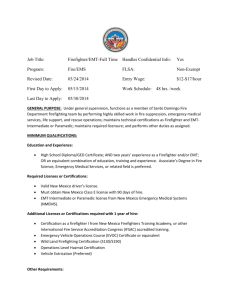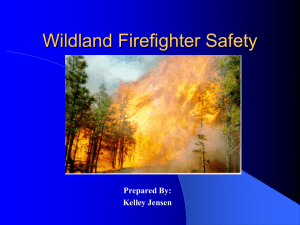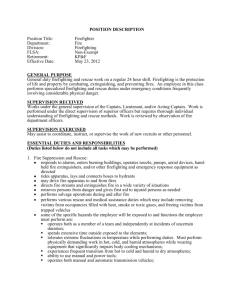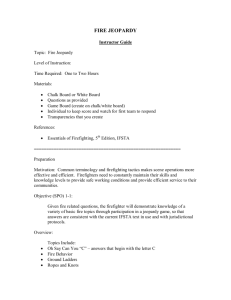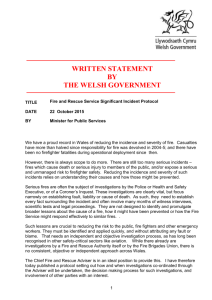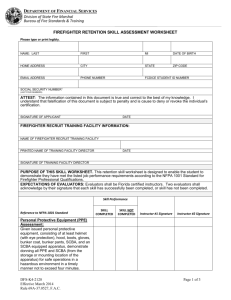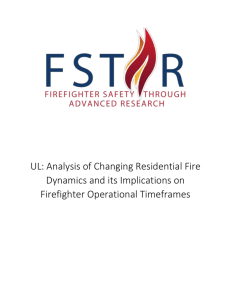FIREFIGHTER - Carolina Beach
advertisement
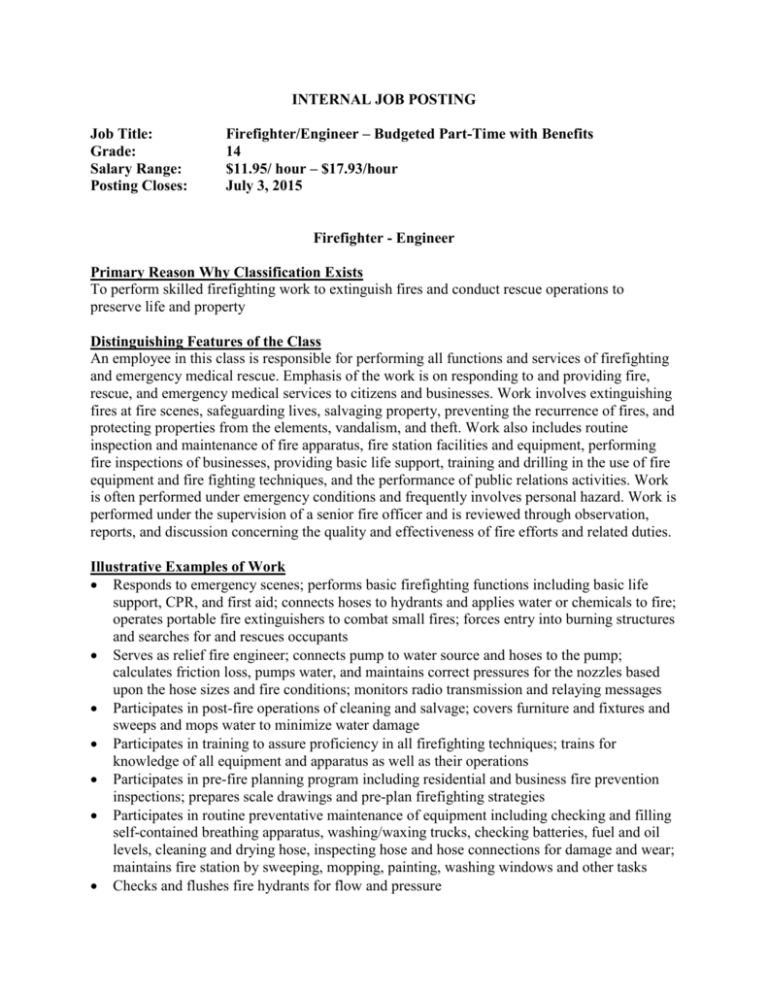
INTERNAL JOB POSTING Job Title: Grade: Salary Range: Posting Closes: Firefighter/Engineer – Budgeted Part-Time with Benefits 14 $11.95/ hour – $17.93/hour July 3, 2015 Firefighter - Engineer Primary Reason Why Classification Exists To perform skilled firefighting work to extinguish fires and conduct rescue operations to preserve life and property Distinguishing Features of the Class An employee in this class is responsible for performing all functions and services of firefighting and emergency medical rescue. Emphasis of the work is on responding to and providing fire, rescue, and emergency medical services to citizens and businesses. Work involves extinguishing fires at fire scenes, safeguarding lives, salvaging property, preventing the recurrence of fires, and protecting properties from the elements, vandalism, and theft. Work also includes routine inspection and maintenance of fire apparatus, fire station facilities and equipment, performing fire inspections of businesses, providing basic life support, training and drilling in the use of fire equipment and fire fighting techniques, and the performance of public relations activities. Work is often performed under emergency conditions and frequently involves personal hazard. Work is performed under the supervision of a senior fire officer and is reviewed through observation, reports, and discussion concerning the quality and effectiveness of fire efforts and related duties. Illustrative Examples of Work Responds to emergency scenes; performs basic firefighting functions including basic life support, CPR, and first aid; connects hoses to hydrants and applies water or chemicals to fire; operates portable fire extinguishers to combat small fires; forces entry into burning structures and searches for and rescues occupants Serves as relief fire engineer; connects pump to water source and hoses to the pump; calculates friction loss, pumps water, and maintains correct pressures for the nozzles based upon the hose sizes and fire conditions; monitors radio transmission and relaying messages Participates in post-fire operations of cleaning and salvage; covers furniture and fixtures and sweeps and mops water to minimize water damage Participates in training to assure proficiency in all firefighting techniques; trains for knowledge of all equipment and apparatus as well as their operations Participates in pre-fire planning program including residential and business fire prevention inspections; prepares scale drawings and pre-plan firefighting strategies Participates in routine preventative maintenance of equipment including checking and filling self-contained breathing apparatus, washing/waxing trucks, checking batteries, fuel and oil levels, cleaning and drying hose, inspecting hose and hose connections for damage and wear; maintains fire station by sweeping, mopping, painting, washing windows and other tasks Checks and flushes fire hydrants for flow and pressure Firefighter Town of Carolina Beach Page 2 Conducts fire prevention education demonstrating use of fire extinguishers and smoke detectors; helps develop escape plans; installs child safety seats for citizens with children Conducts tours of fire stations and performs public demonstrations at schools, community meetings, and other locations Performing related work as required Knowledge, Skills, and Abilities Knowledge of the procedures of fire fighting, hazards, and related safety precautions Knowledge of fire codes and the contents of general orders, bulletins, and training materials Knowledge of emergency medical treatment techniques Knowledge of Town geography and street locations Knowledge of sprinkler systems in buildings and hydrant locations Knowledge of effective interpersonal communications techniques to communicate with other staff, officials, and the general public Skill in the use of firefighting tools and equipment such as a pry bar, axe, hoses, nozzles, air packs, fans, shovels, rakes, sledge hammers, jaws-of-life, defibrillator, and other equipment Ability to conduct fire prevention and fire safety training to all age groups including school age children through senior citizens Ability to perform difficult physical procedures for prolonged periods wearing protective clothing and in adverse weather conditions; ability to climb ladders and work at considerable heights; ability to carry or drag or assist in carrying or dragging persons and equipment up and down ladders and stairs or across flat surfaces; ability to chop holes or pry openings in doors, walls, ceilings, roofs, and other surfaces to effect ventilation; ability to screw in hoses connections and gate valves to fire hydrants; ability to apply hose clamps onto charged and uncharged hose lines; ability to hold charged hose lines and direct them at fire sources; ability to locate and estimate distances between objects and persons inside or near burning structures Ability to demonstrate self-confidence, self-reliance, and to take action when required by the situation; ability to confront potentially dangerous situations, remain calm, apply common sense, make logical decisions, and work effectively in stressful situations Ability to learn and apply the training needed to extinguish fires, rescue trapped persons, dispose of hazardous materials, and operate firefighting equipment Ability to establish effective working relationships with members of the squad, company, station house, and the general public; ability to co-exist and work cooperatively with a group of individuals for twenty-four hours at a time without regard for such characteristics as gender, race, or cultural background Ability to understand written and oral instructions Physical Requirements This is heavy work requiring the exertion of 100 pounds of force occasionally, up to 50 pounds of force frequently, and up to 20 pounds of force constantly to move objects. Work requires stooping, kneeling, crouching, reaching, standing, walking, pushing, pulling, lifting, climbing, Firefighter Town of Carolina Beach Page 3 fingering, grasping, and repetitive motions. Vocal communication is required for expressing or exchanging ideas by means of the spoken word. Hearing is required to perceive information at normal spoken word levels. Employee must have the visual acuity to be the operator of a truck and other equipment and be able to distinguish colors and see peripherally in both eyes, inspect small defects or parts, operate or inspect equipment, use measurement devices, and to determine the accuracy of work assigned. Employee must have the stamina to work for extended periods, in varied weather conditions, and in emergency situations Working Conditions Employee is subject to both inside and outside environmental conditions including extreme heat and extreme cold. Employee is subject to noise, vibration, and hazards including a variety of physical conditions such as proximity to moving mechanical parts, electrical current, working in high places, exposure to high heat, and exposure to chemicals. Employee is subject to atmospheric conditions that affect the respiratory system of the skin including oils and greases and is also required to wear a respirator or self-contained breathing devices in certain instances. Employee frequently works in close quarters and areas which could cause claustrophobia. Employee may be exposed to blood or blood-borne pathogens when providing emergency medical services. At times the work is performed in conditions of extreme temperatures and danger for prolonged periods of time during which time one’s vision may be partially or totally obscured. Work is performed under emergency conditions and involves personal hazard. Education Graduation from high school or GED equivalency Experience A minimum of one (1) years’ experience in fire suppression and/or prevention. Special Requirements Valid North Carolina Drivers’ License; North Carolina “Non-commercial Class B” driver’s license desired NC certification as Level II Firefighter and Emergency Medical Technician (EMT) Employee required to successfully complete the NIMS course work applicable to the position within one year FLSA Status: Nonexempt (Section 7(k) of the FLSA provides that employees engaged in fire protection or law enforcement may be paid overtime on a “work period” basis. A work period may be from 7 consecutive days to 28 consecutive days in length. For work periods of at least 7 but less than 28 days, overtime pay is required when the number of hours worked exceeds the number of hours that bears the same relationship to 212 (fire) or 171 (police) as the number of days in the work period bears to 28. For example, fire protection personnel are due overtime under such a plan after 106 hours worked during a 14-day work period, while law enforcement personnel must receive overtime after 86 hours worked during a 14-day work period). Disclaimer Firefighter Town of Carolina Beach Page 4 This classification specification has been designed to indicate the general nature and level of work performed by employees within this classification. It is not designed to contain or be interpreted as a comprehensive inventory of all duties, responsibilities, and qualifications required of employees to perform the job. The Physical Requirements and Working Conditions section of this classification may vary from position to position and a more thorough description of these elements can be found in the employee’s Position Analysis Questionnaire (PAQ). The Town of Carolina Beach reserves the right to assign or otherwise modify the duties assigned to this classification. April 2015
